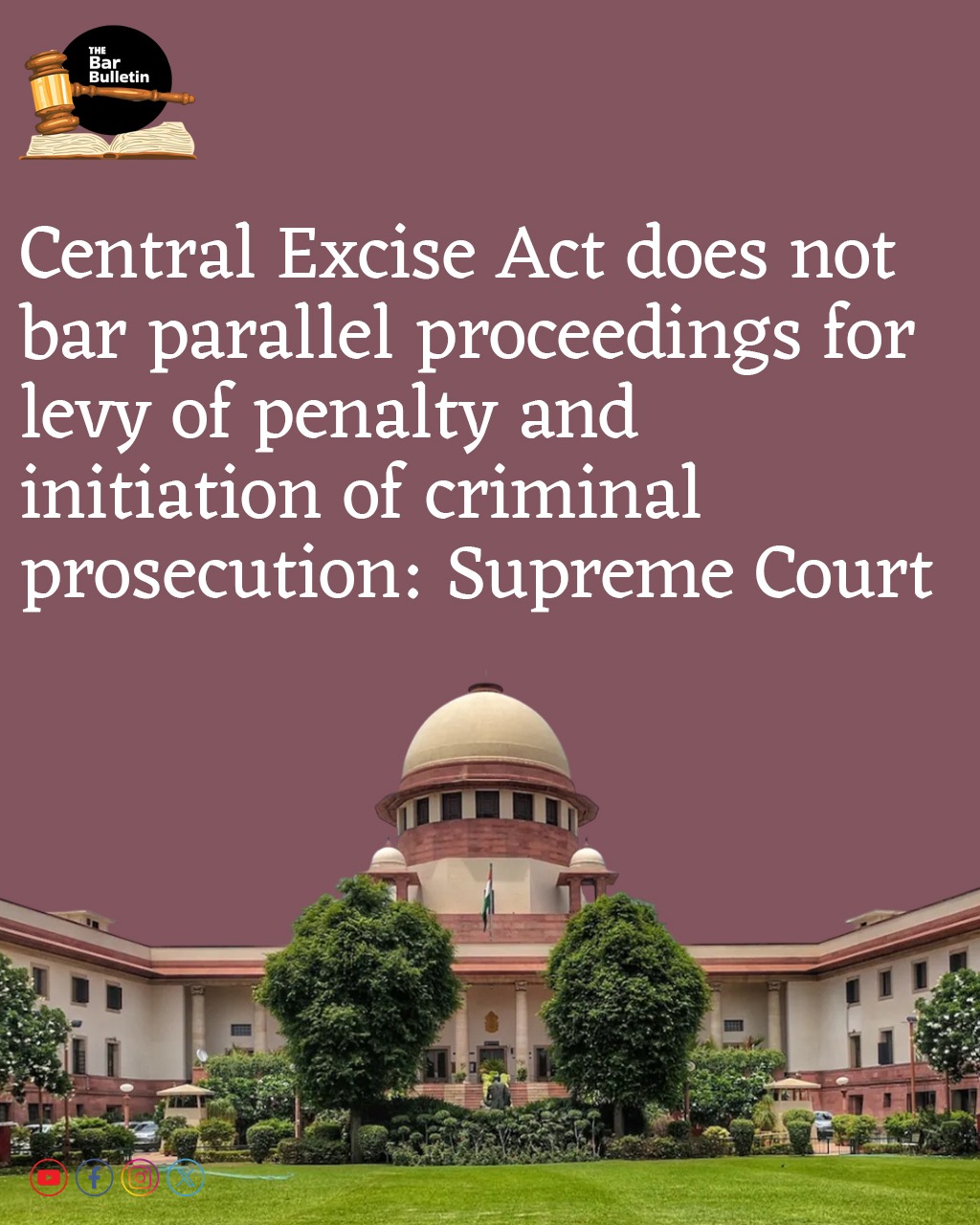The Supreme Court recently ruled that there is no bar on parallel proceedings, where one is concerning the levy of penalty for unlawful removal of excisable goods along with evasion of excise duty under Section 11AC of the Central Excise Act, 1944 (CEA), and the other one is for criminal prosecution under Sections 9 and 9AA of the CEA.
At the same time, pointing out that the adjudication with relation to imposition of penalty and tax demand is still not settled in favour of the Appellants by the Trial Court, the Division Bench comprising Chief Justice B R Gavai and Justice Augustine George Masih observed that the direction of the High Court for de novo proceedings on procedural grounds can’t be assumed as having been set aside on merits, when it was specifically mentioned that merits has not been considered.
In this case, a search was conducted at the premises of the Appellants, unearthing serious irregularities that culminated in the issuance of two separate Show Cause Notices (SCN), the first one alleging clandestine manufacture and illicit removal of excisable goods, as well as the second one for attribution of direct and vicarious liability to the Directors of the Appellant companies, for such unlawful removal of excisable goods along with evasion of excise duty, interest, and penal consequences. Since the proceedings under the first SCN were dropped and seized goods were released, the Appellants overlooked the serious and distinct liabilities arising under the Second SCN, regarding which the Commissioner of Central Excise upheld a substantial demand amounting to INR 6.68 crores along with interest against Appellants and further imposed a penalty of INR 25 lacs under Section 11AC of the CEA 1944, indicative of the gravity of their violations.
The CESTAT remanded the matter for de novo consideration, observing that joint confirmation of duty against separate legal entities was impermissible, and liability was required to be assessed individually. Then, seeking to stall the criminal trial, the Appellant invoked writ jurisdiction, wherein the High Court, though granted interim protection, however, refused to quash the proceedings and directed the Appellants to avail the remedy of discharge before the Trial Court. In the meanwhile, the re-adjudication based on CESTAT’s order culminated in a fresh Order for reimposing demands and penalties, and the Trial Court also rejected the discharge applications. The High Court also reiterated the findings of the Trial Court and observed that there exists prima facie evidence against the Appellants to proceed with the concerned Complaint.
When the matter reached the Apex Court, it was found that the irregularities which came to light on search and the contents of the investigation report are sufficient to observe prima facie on the existence of allegations as mentioned in the complaint against the Appellants, at the time of the consideration made by the Trial Court, justifying the passing of the summoning order. The Apex Court also pointed that the stay on penalty was subject to the payment of the liability imposed on the Appellants in the pending writ and submission of surety on the penalty imposed.
Speaking for the Bench, Justice Augustine observed that there is no bar on parallel proceedings, with one being by the Respondent-Department and the other being criminal in nature, under the CEA 1944. Thus, having perused the alleged conduct and the orders passed by the concerned authorities and the Courts, the Bench refused to interfere in the decision of the High Court, and dismissed the SLP by answering in favour of the Central Excise Department.
Cases Relied On:
Radheshyam Kejriwal v. State of West Bengal – (2011) 3 SCC 581
Videocon Industries Limited and Another v. State of Maharashtra and Others – (2016) 12 SCC 315
Appearances:
Appellant : Mr AOR Syed Shahid Hussain Rizvi.
Respondent: ASG S. Dwarakanath, AOR Gurmeet Singh Makker & Ankit Goel, and Advocates Rajat Vaishnaw, Prabhakar Yadav, S Vijay Adithya, and Vikas Bansal.



